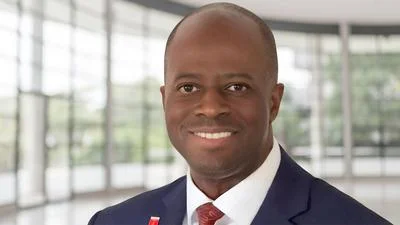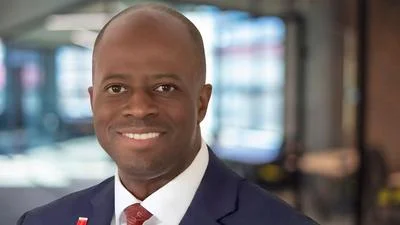State Rep. Curtis J. Tarver II | State Rep. Curtis J. Tarver II/ Facebook
State Rep. Curtis J. Tarver II | State Rep. Curtis J. Tarver II/ Facebook
State Rep. Curtis J. Tarver, II (D-Chicago) is one of many General Assembly Catholic school alumni who have failed to ensure the funding is in place for Invest In Kids Tax Scholarship program.
Tarver personally benefitted from a private school education but has not shown support for extending the Invest In Kids Tax Credit Scholarship program. Tarver himself attended Marian Catholic High School, which he had to leave after his parents could no longer fund his education. Still, he said in a profile piece that he is dedicated to Catholic education.
“I’ve always been passionate about Catholic education,” Tarver said.
He said that his Catholic education had a significant impact on his life.
“I always had someone who took me aside and said, ‘Hey, you’re a smart kid with a bad attitude’ and then helped keep me on the right path,” Tarver said of his Catholic school experience. “But these kids are far brighter than I was at their age. I’d be doing the entire world a disservice if I didn’t help out these kids, who are going to do really great things.”
Many students at Marian Catholic High School have been able to attend the school who would not otherwise due to the Invest In Kids Act. The school, which costs at least $12,560 to attend per year, serves several qualifying students.
“The Illinois Invest in Kids Program has been a tremendous benefit to Marian Catholic students,” Marian Catholic High School’s website reads. “Over the last five years, students have received about 70 scholarships totaling more than $700,000. Currently, more than 200 students are on the waitlist for this scholarship. The demand for quality education like that offered at Marian Catholic is high.”
Tarver is one of 35 of Illinois' 177 state legislators who attended private high schools. The private high school graduates include 10 Republicans and 25 Democrats, 15 of whom were raised in the City of Chicago.
Excluded from the Democrat-led 3,500 pages state budget of $50.5 billion was funding needed to continue the Invest In Kids Tax Credit Scholarship Program. The program allows donors to receive a tax benefit for donating to a state-maintained scholarship program for private schools for low-income families. It serves more than 9,000 K-12 students.
“This is not something that’s been covered by the budget agreement," Gov. Pritzker said at a press conference announcing a budget deal had been struck. "It’s something that still has time, potentially, but it’s not something that’s in the budget agreement.”
Critics highlighted the hypocrisy of lawmakers who agreed to sunset the program. Pritzker and other politicians had sent or were sending their own children to expensive private schools while denying the same opportunity to less fortunate students.
The Wall Street Journal underscored the power dynamics between teachers' unions, Democratic lawmakers, and the failure of the public education system. The decision to shut down the scholarship program disregarded the needs of low-income students but prioritized the interests of unions over educational reform. The main reason behind the opposition to the program was the influence of teachers' unions, with the agenda to terminate it because its popularity highlighted the failures of public schools.
Last year alone, the Invest in Kids program received more than 31,000 applications, signifying a high demand for alternatives to underperforming public schools. Many low-income families, particularly Black and Hispanic, supported the scholarship program because their assigned Illinois schools had low proficiency rates in reading and math.
The failure of the public education system was evident from the fourth to eighth grades, leading to a high demand to seek options. However, the unions prioritized their power over student learning and pointed fingers at the schools' failures on lack of funding rather than addressing systemic issues.
The WSJ opinion piece also noted that union leaders hold significant influence over Illinois lawmakers, who have received substantial campaign contributions from teachers' unions.






 Alerts Sign-up
Alerts Sign-up